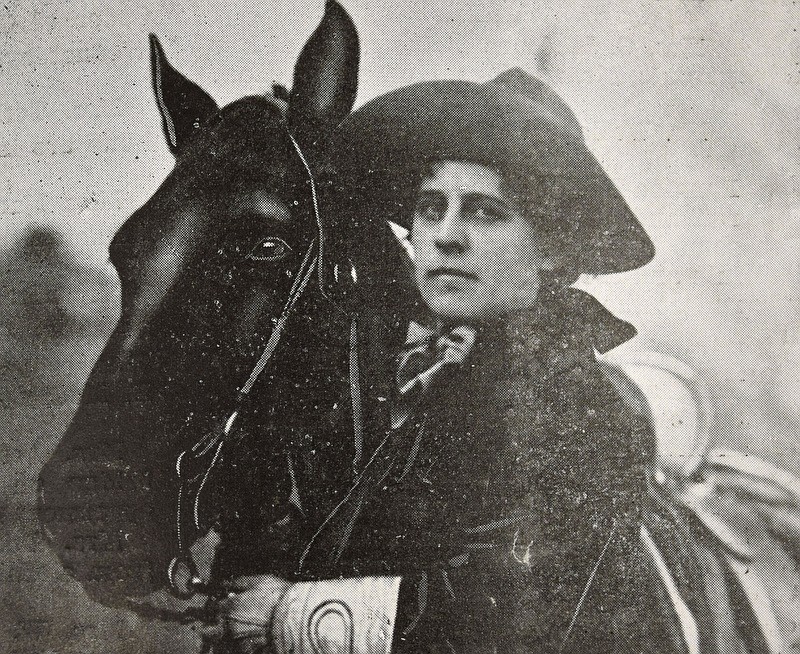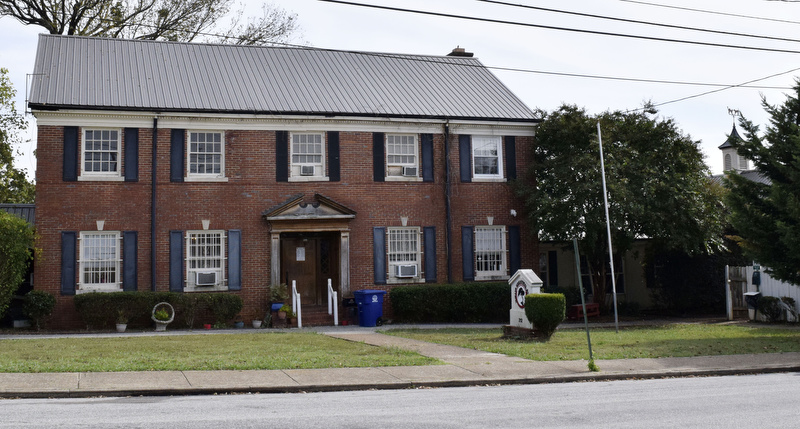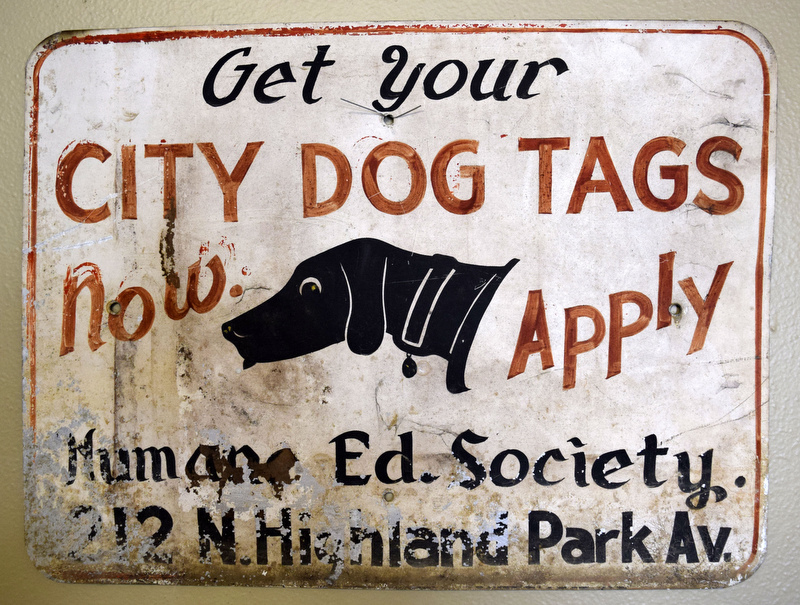Ethel Soper Hardy's words and deeds in defense of Chattanooga's unfortunate children and animals in the early 20th Century inspired people here and the world over to consider the welfare of the "dumb creatures" under human care.
Hardy might have inspired and outraged people now as much as she did then. In the early 1900s, it was not uncommon to see her picking up stray cats and dogs while driving her carriage through town, according to historical records.
Michigan-born Hardy, the widow of former Chattanooga Mayor Richard Hardy, is credited with launching Chattanooga's Humane Educational Society, incorporated in 1910, and campaigning for the rights of abused, abandoned and neglected animals and, later, children. She also funded the organization's current building on North Highland Park Avenue.
Hardy left behind a legacy of courage, gentleness and unwavering dedication to the society that celebrated its 100th anniversary in 2010.
Phil Snyder, now executive director, compared Hardy to New York City philanthropist Henry Bergh, who founded the American Society for the Prevention of Cruelty to Animals, known as the ASPCA, in 1866.
"I think she was one of the very few people in her day that stepped up and was very outspoken to protect animals," Snyder said Thursday.
SOCIETY TIMELINE
1910: Ethel Soper Hardy and business leaders found the Humane Education Society1919: Society begins work with children1926: HES shifts to child protection services and animal control1940: Ethel Soper Hardy provides funds for the temporary children’s home, Humane Society office and animal shelter at the organization’s present locationSource: Times Free Press archives, Humane Educational Society records
(Read more Moments in Memory stories here to celebrate the Times Free Press turning 150 years old)
"I spent time investigating rodeos, and to know that somebody back in her era recognized the cruelties going on and spoke out is just a tremendous thing," he said. A saddle for the horse Hardy rode to patrol Chattanooga is displayed in Snyder's office.
Hardy's lifelong efforts are detailed in archives at the Times Free Press, the Chattanooga Public Library and the Humane Society.
"Our Golden Rule is, 'Do to beings below you as you would be done by beings above you,'" Hardy wrote as president in the September 1923 society publication, the Humane Record, in a first-person article explaining "Why an animal shelter?"
She reflected in the article on her childhood experiences with her father on their small farm in the Muskegon River Valley in Michigan.
"As I look back upon my childhood, I can see myself like an island, entirely surrounded, not by water, but by animals. My father, who loved them, always had them about him in such numbers that our home was very like a menagerie; though, be it said, it was a barless one, for all its inmates enjoyed the freedom of the place," she wrote.
But as she aged, she became more sensitive to animals' plight.
"As I grew out of childhood, I began to observe everywhere I went, the injustice to animals, the underserved and senseless cruelty practiced upon them, and the indifference of educated and Christian people to their patient sufferings," Hardy wrote. "It was quite natural, that when the opportunity presented itself, I should become a member of an organization devoted to the defense of the rights of animals and to the teaching of kindness to every living creature."
In her earliest years, Hardy first joined a small group of women that formed the Chicago Anti-Cruelty Society. A bit later in Pittsburgh, she worked with the Western Pennsylvania Humane Society. Finally she pursued the work in Chattanooga.
"I spent my days on horseback, ferreting out cruelty in the byways and alleys, patrolling the mountain roads - for in those days horses and mules were doing all the hauling and the cases of animals with galled necks and shoulders were many - examining animals in construction camps and in jockey yards, and taking up the trail of the trafficker in old and worn-out animals," she wrote. "As there was no office and no telephone, my home phone began to receive reports and complaints from all parts of the city and county."
Hardy wanted a "businessman" to take up the mantel of president of the society, but when none would, "I consented to take upon my shoulders the whole responsibility of a burden which had already become noticeably heavy."
She served as president without pay for many years, established the society's first office in the city municipal building and "hired a girl for $5 a week to keep the office open and answer the telephone."
The society office of eight employees was "one of the busiest offices in the city," she wrote in 1923.
The society's current building on North Highland Park Avenue was a crowning jewel of decades of work by Hardy and fellow society members when the $32,000 building was finished in 1940, not long before Hardy's death in 1944.
An August 1945 Chattanooga News-Free Press article on Hardy leaving the society $50,000 in her will prompted a caller to the paper to complain, "I see that Mrs. Hardy has ordered that $50,000 of her estate go to the dogs. Why could she not do something to relieve human misery?"
The debate over whether taking care of people or animals was more important was a battle Hardy waged often, pontificating in the society's publication, The Humane Record, on the duty of a civilized people to themselves, each other and the animals in their care.
She saw all human and animal lives as interdependent in a community, and she felt more resources were already directed at human issues.
"As we have written, not all of us can be actively interested in the same projects. But we can be MORALLY interested in all that is good, in all that is obviously helpful," Hardy wrote in the September 1923 Humane Record.
"You do not have to own dogs and cats in order to understand their rights. You do not even have to be interested in them in order to understand that upon their decent treatment depends much of the comfort and well-being of the community," she wrote.
In newspaper accounts, Hardy railed about abuse and cruelty in circuses and rodeos, and torture of animals by "indifferent" youth and adults. She decried cropping dogs' ears and the "slaughter" of 30 squirrels in one hunting outing, and often prosecuted animal cruelty cases.
Hardy was often a target of those who disagreed with her.
"I have been threatened with whippings and injunctions and guns; I have been arrested, not once but several times, and sued for damages in cases of old horses I had destroyed; I have stood from early morning till dark before a half drunken mob of men to prevent their shooting at live fowls during the holiday turkey shoots; I have been laughed at by those in authority and humiliated in the courts; I have been refused financial assistance by some of our richest citizens; I have been denied the support of a board of directors because I could persuade no one to serve; I have never received the co-operation of any women's clubs or organizations, nor, with one exception, have I been helped by any men's clubs or other organizations; I have fought a single-handed fight - persistently, stubbornly - with all the physical endurance and all the moral courage at my command."
Hardy's legacy continues to inspire today.
"I think she was would be very proud of the Humane Educational Society today as we look forward to moving into a new facility that's going to provide even more humane care for the animals and to be more customer friendly for the people that come," Snyder said. Crews will break ground on the new facility on Access Road in the coming weeks.
"We owe the start of all these good things that are going to happen to her."
Contact Ben Benton at bbenton@timesfreepress.com or 423-757-6569. Follow him on Twitter @BenBenton or at www.facebook.com/benbenton1.



